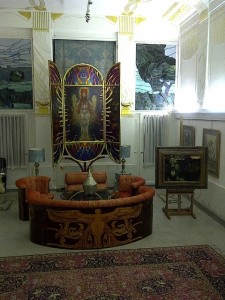THE FREEDOM OF ART IS THE ONLY GUARANTEE FOR THE FREEDOM OF HUMANKIND
Art is a metaphor for immortality. – Ernst Fuchs
After 31,315 days on this earth, Austrian artist Ernst Fuchs passed away at the age of 85. Over a year ago, some friends and I visited the Fuchs villa where the artist lived and exhibited his work.
Professor Ernst Fuchs was one of the leading figures in the Viennese School of Painting ”Fantastic realism.“ For him art was more than a way to creatively expressive oneself, it was an essential power of peace and liberation:
Art is, despite its dynamic and that of its supporters’ own egocentricity, always a peacemaking power. We know it, we’ve learned it and from this knowledge we exercise the liberating, the healing power of art. It is exactly for this reason that all craziness has to become art, all politics and every intention that is focused on improving the conditions of human existence, should manifest itself artistically. The only positive revolution that has a chance to permanently liberate humankind and to stimulate is the works of artists. The freedom of art is the only guarantee for the freedom of humankind, this freedom is therefore also the first, which a populace is forced to sacrifice, when a tyrant comes and wants to rule.
(translation: KC Blau)
German original:
Kunst ist trotz ihrer Dynamik und der ihren Trägern eigenen Egozentrik immer eine Frieden stiftende Kraft. Wir wissen es, wir haben es gelernt und wir praktizieren aus dieser Kenntnis die befreiende, die heilende Kraft der Kunst. Darum muss aller Wahnsinn Kunst
werden, alle Politik und jeder Wille, der sich auf die Verbesserung der Daseinsbedingungen des Menschen richtet, sollte kunstvoll sich manifestieren. Die einzig positive Revolution, die eine Chance hat, permanent den Menschen zu befreien und zu befruchten, ist das Wirken der Künstler. Die Freiheit der Kunst ist der einzige Garant der Freiheit des Menschen; diese Freiheit ist daher auch die erste, die ein Volk gezwungen wird aufzugeben, wenn ein Tyrann kommt, es zu beherrschen.
Read more about Ernst Fuchs at my post about a visit to his museum: Are you are Lebenskünstler? Or just a Connoisseur of the Art of Living?
RIP Ernst Fuchs – indeed, art is a metaphor for immortality and you will surely continue on in your art.










